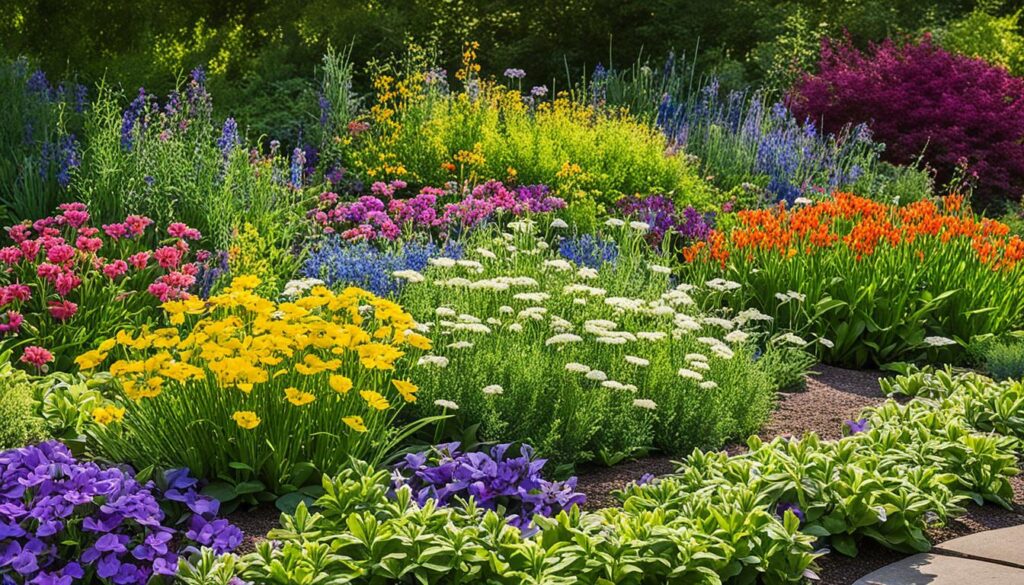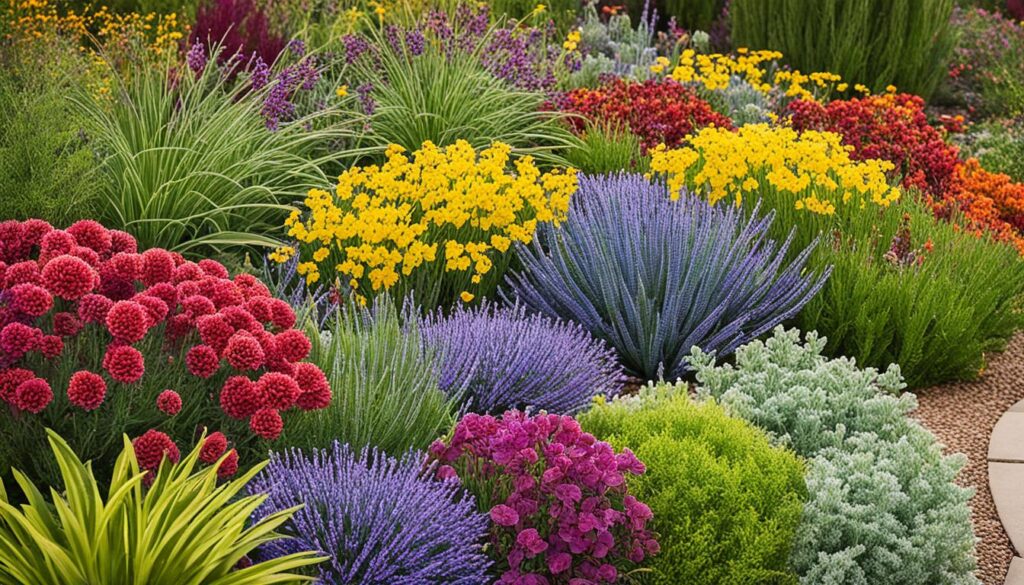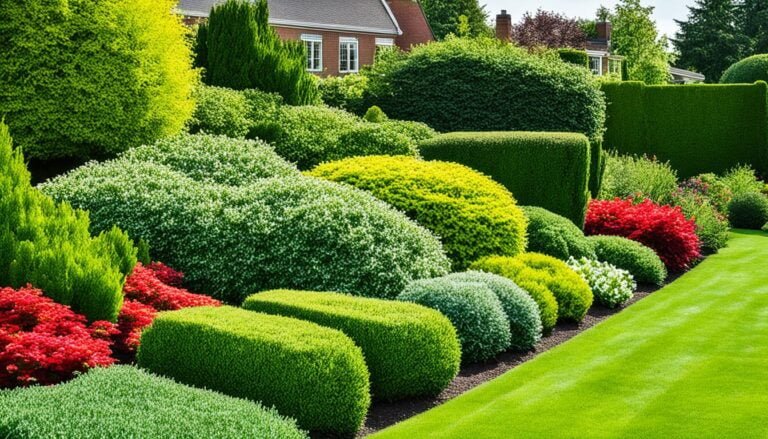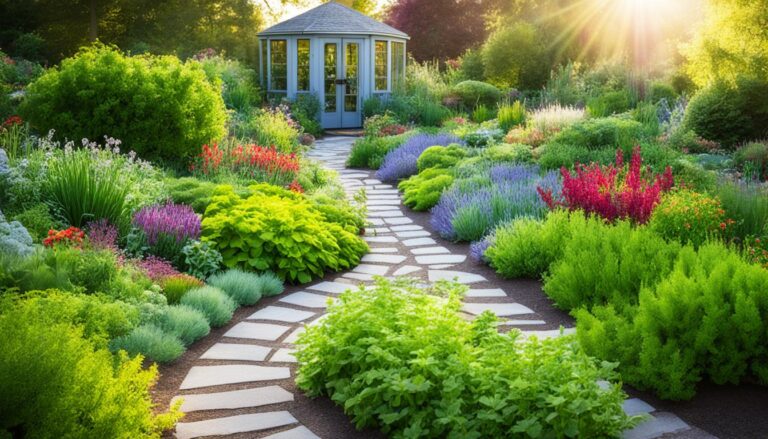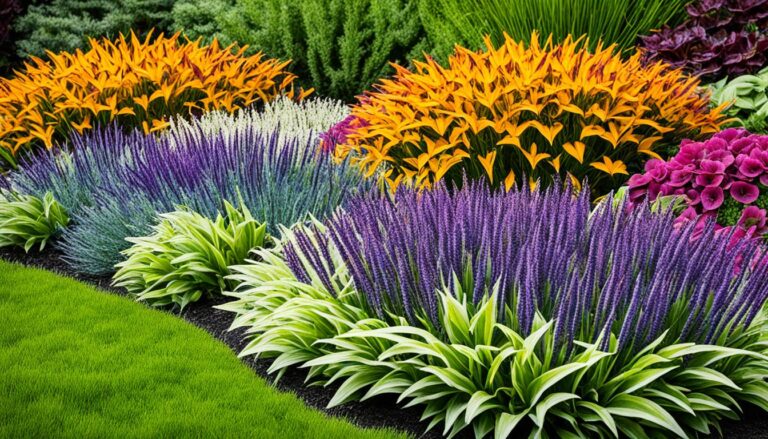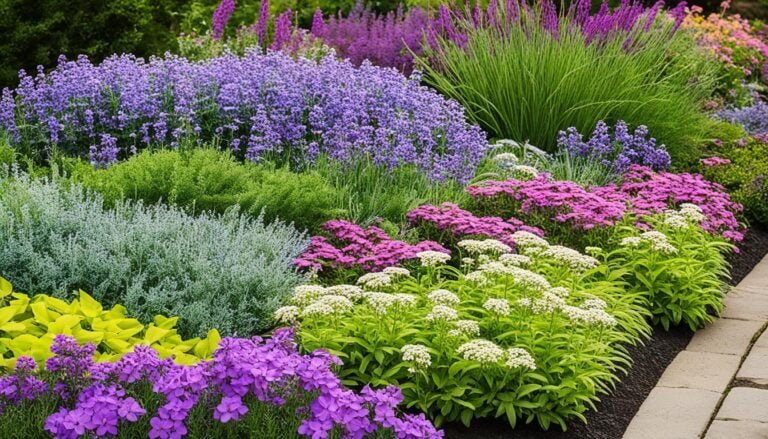Low growing flower perennials bring a beautiful mix of colors and textures to gardens. They are not just pretty; they are also great for covering the ground, creating lively borders, and filling empty spots in your yard. Plus, they need less water and care than plants that live for just one year.
Key Takeaways
- Low growing flower perennials provide lasting color and texture.
- They are ideal as ground cover plants, creating vibrant borders.
- Small perennial flowers require less water and care compared to annuals.
- Perennials like Astilbe and Daylilies thrive in USDA Zones 4-9.
- Perennials are excellent for filling gaps in landscapes efficiently.
Introduction to Low Growing Perennials
Low growing flower perennials are a diverse group. They add life to gardens with little upkeep. Thriving in all kinds of weather, these plants require easy care yet offer year-round beauty. They stand about one to one and a half feet tall, perfect for sprucing up garden edges.
Some plants, like delosperma and ajuga, spread like a carpet. But others, such as Heuchera, grow in neat clumps. This keeps your garden looking tidy and pretty.
Heuchera is a favorite because it grows in cold areas and comes in many colors. Sedums also vary, with some used as carpets and others forming attractive mounds. The creeping phlox is another beauty. It blooms reliably and flows over the edge of garden beds.
If your garden has some shade, hostas thrive there. They get really big, though, so plan wisely. Sea thrift is perfect for small, colorful spots. And Lewisia from North America grows just over a foot high, loving the sun, and shows off lovely flowers.
Low growing perennials are the heroes of easy gardens. They fill your space beautifully with little work. Mixing them creates a lovely, easy-to-care-for garden.
- Heuchera: Hardy to zone 4, wide color range
- Sedums: Variety of types, from groundcovers to mound formers
- Creeping Phlox: Reliable blooming and tier-cascading
- Hostas: Excellent for part sun to shady areas
- Sea Thrift: Short, decorative with pom-pom-like flowers
- Lewisia: Native to North America, thrives in full sun
Low Growing Flower Perennials for Borders
Are you looking to make your garden borders more beautiful with little effort? Perennial plants for borders are your answer. They combine beauty with practicality. Perennials like Astilbe, Bleeding Heart, and Bearberry are compact and stunning.
Astilbe has feathery plumes in colors from white to deep purples. It loves shade, so it’s perfect for borders with less light. Bleeding Heart, with heart-shaped blooms, adds soft charm, especially in moist soils.
Bearberry forms a glossy green mat, turning red in fall. It can thrive in different soils and tough weather. This makes it a strong pick for borders.
To create a lush border, choose plants that work well together. Geranium sanguineum has magenta flowers and lobed leaves for beauty and texture. Nepeta, offering lavender-blue flowers and grey-green leaves, is good for bees and butterflies.
Stachys byzantina has silver leaves for a unique touch. It also doesn’t need much water and keeps deer away, making it low maintenance. Hakonechloa macra adds graceful motion with its cascading foliage.
Using these perennials keeps your garden borders lively and attractive all year. They need less work than tall plants. This means an easy and beautiful way to keep your garden’s borders looking natural and well-kept.
Colorful Choices: From Reds to Purples
If you love bright colors but don’t want to spend too much time caring for your plants, colorful low maintenance perennials are just what you need. They come in all sorts of colors, from intense reds to dark purples. These flowers will make your garden look stunning with their vivid shades.
Astilbe
Astilbe is known for its fluffy blooms and wide range of colors, from snowy white to mysterious purple. It loves the shade and does best in soil that’s rich, loose, and drains well. You can expect it to reach about 3 feet in height, perfect for adding a splash of color to areas that need it most.
Bleeding Heart
If you’re looking for something unique, the Bleeding Heart is a stunning choice. It has pretty heart-shaped flowers and thrives in damp, organic, slightly acidic soil. This plant not only looks beautiful but is also easy to care for. It brings a sweet touch to the shady parts of your garden with its lovely blossoms.
Blanket Flowers
Blanket Flowers are known for their beautiful red and yellow blooms. They thrive in sunny spots and are quite adaptable, able to grow in various temperature settings. These plants are both gorgeous and tough, promising to bring vibrant color to your garden year after year.
Here’s a quick look at these colorful, easy-to-care-for perennials:
| Plant | Sun Exposure | Soil Type | Height | Zones |
|---|---|---|---|---|
| Astilbe | Shade | Well-fertilized, Well-draining | Up to 3 feet | 4-8 |
| Bleeding Heart | Part Shade | Moist, Organic, Slightly Acidic | Up to 3 feet | 4-8 |
| Blanket Flowers | Full Sun | Well-draining | Up to 3 feet | 3-10 |
By choosing these vibrant low maintenance perennials, your garden can become a tranquil, picturesque space with little work. They provide colorful blooms and strong growth all year round. For anyone passionate about gardening, their durability and beauty make them an unbeatable choice.
Low Maintenance Perennials
Cultivating low maintenance perennials has great benefits. They thrive with little upkeep. For example, Creeping Phlox and Dwarf Fountain Grass need just a bit of water and yearly cleanup to grow well.
These plants can be small or pretty tall, perfect for various garden sizes. Plants like Echinacea purpurea and Coreopsis lanceolata are good examples. They love the sun and some shade, offering colorful blooms all year.
Low maintenance perennials can handle different soils and areas. They can grow in dry or wet places. Most do well in zones 3 to 10, meaning many gardeners can enjoy them. For example, Rudbeckia spp. does best in zones 3 to 9, and lavender likes zones 5 to 9.
Growing Conditions:
| Perennial | Height | Width | Zones | Conditions |
|---|---|---|---|---|
| Black-eyed Susan (Rudbeckia hirta) | 2-3 feet | 2-3 feet | 3-9 | Full sun |
| Coneflowers (Echinacea spp.) | 2-4 feet | 1-2 feet | 3-9 | Full sun |
| Lavender (Lavandula spp.) | 1-3 feet | 1-2 feet | 5-9 | Full sun |
| Daylilies (Hemerocallis fulva) | 1-4 feet | 1-4 feet | 3-9 | Full sun to part shade |
It’s crucial to plant them right. For example, daylilies do well in the sun with some mulch. Be careful with toxic plants, like some hellebores, around pets and kids.
Hardy perennials make pretty, easy-to-care-for gardens. Choosing plants like Hosta spp. and Liatris spicata helps pollinators and fights off pests. This makes your garden beautiful and eco-friendly without much work.
Ideal Ground Cover Varieties
Ground cover plants help reduce soil erosion and make gardens look beautiful. Some top choices include Bearberry, Creeping Thyme, and Creeping Phlox. They are great because they can adapt to different soils and are good even in dry conditions.
Bearberry
Bearberry is a small, evergreen plant that likes sandy, rocky soil with acidic pH. It’s good for tough soil and can grow 6-12 inches high. It has red berries and pinkish-white flowers, adding color to gardens.
Creeping Thyme
Creeping Thyme is an herb that smells nice and is good for the soil and for cooking. It is very low, growing only 1-2 inches, and covers the ground well. It has tiny purple flowers and green leaves, making gardens beautiful.
Creeping Phlox
Creeping Phlox has pretty, star-shaped flowers and keeps its leaves green all year. It’s great for sloping areas and garden borders. This plant prefers well-drained soil and full sun. It grows up to 6 inches high, covering the ground in bright colors.
| Plant | Height | Soil Requirement | Zones | Sun Exposure |
|---|---|---|---|---|
| Bearberry | 6-12 inches | Sandy, rocky, acidic | 2-6 | Full sun to partial shade |
| Creeping Thyme | 1-2 inches | Loose, neutral | 3-8 | Full sun |
| Creeping Phlox | 6-8 inches | Well-drained | 3-9 | Full sun |
Adding these tough, good-looking plants can make your garden better. They need less care and still look lovely. Choose these ground cover plants for a hardy, pretty yard.
Hardy and Drought Tolerant Perennials
Choosing hardy and drought tolerant perennials is smart for gardeners. These plants can survive dry weather. They need little care but still produce bright blooms and leaves. This category includes Barrenwort, Daylilies, and Catmint.
Barrenwort
Barrenwort has tough leaves and many flower colors. It loves shade, perfect for less sunny areas. It doesn’t need much water to grow well, making your garden look full and beautiful.
Daylilies
Daylilies come in many colors and sizes, adding beauty to any garden. They do well in full sun and need soil that drains water. Daylilies can live through dry periods without much extra care, making them an easy yet stunning addition to your yard.
Catmint
Catmint is from the mint family, known for its fragrant green leaves and pretty purple flowers. It doesn’t just look pretty; it also helps attract beneficial insects while keeping away pests. This plant is tough, handling droughts and tough weather well, a favorite among many gardeners.
| Plant | Height | Zones | Preferred Conditions | Special Features |
|---|---|---|---|---|
| Barrenwort | 18 inches – 2 feet | 3 – 8 | Shaded areas | Leathery leaves, diverse flower colors |
| Daylilies | 1 – 4 feet | 3 – 10 | Full sun, well-drained soil | Large, vibrant blooms |
| Catmint | 2 – 3 feet | 4 – 9 | Full sun | Aromatic leaves, repels pests |
Using drought tolerant plants like Barrenwort, Daylilies, and Catmint can not only make your garden beautiful. It also helps in sustainable gardening.
Compact Perennial Flowers
Compact perennial flowers are great for garden borders and small spaces. Coral Bells and Calla Lilies are excellent choices. They are both beautiful and very practical for many gardens.
Coral Bells
Coral Bells, or Heuchera, have pretty, ruffled leaves and bell-shaped flowers. They do well in USDA Zones 4-8, fitting many climates. Perfect for shade, they bring texture and color to any garden edge. They’re a small plant that makes a big visual impact.
Calla Lily
The Calla Lily (Zantedeschia) has trumpet flowers in many colors, including black. They grow best in USDA Zones 8-10 and like moist, well-drained soil. Their elegance and bold flowers make them standout features in small gardens.
Coral Bells and Calla Lilies show how small plants can make a garden beautiful. They add color and interest without needing much room. With many types and colors available, they offer endless design possibilities for your garden borders.
Conclusion
Low growing flower perennials play a crucial role in sustainable and attractive gardens. They live for many years and reproduce, which decreases the need for constant replanting. Plants like Daylilies, Sedum, Coneflowers, and Hostas require little upkeep, making them perfect for garden lovers.
Perennials used at borders and as ground cover bring several benefits. They reduce the work needed because they don’t need replanting yearly. Their deep roots help them survive dry spells and control erosion. Plus, these plants keep weeds at bay. A garden filled with perennials keeps the environment interesting with different species blooming at various times.
It’s best to plant perennials in the spring or fall for strong root growth. Steps include loosening the soil, creating a wide hole for the plant, then filling it with soil and water. After planting, adding mulch and keeping the soil moist is advised. To keep these plants healthy, prune them in the fall or early spring and feed with slow-release fertilizer yearly.
Choosing the right perennials and taking care of them well results in a beautiful garden. These plants are great for filling empty spaces or outlining garden borders. They are not only a practical choice but also add elegance to any outdoor area.



